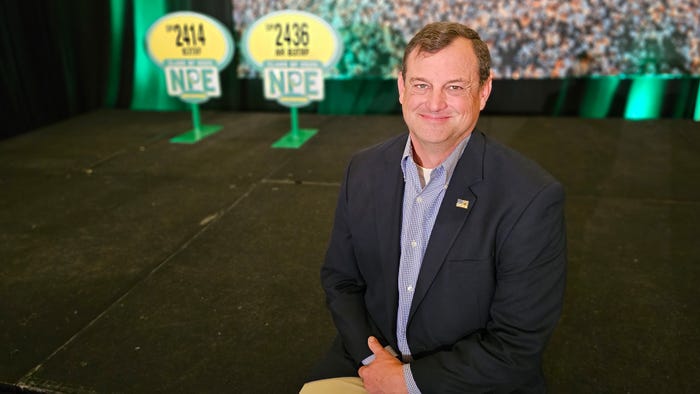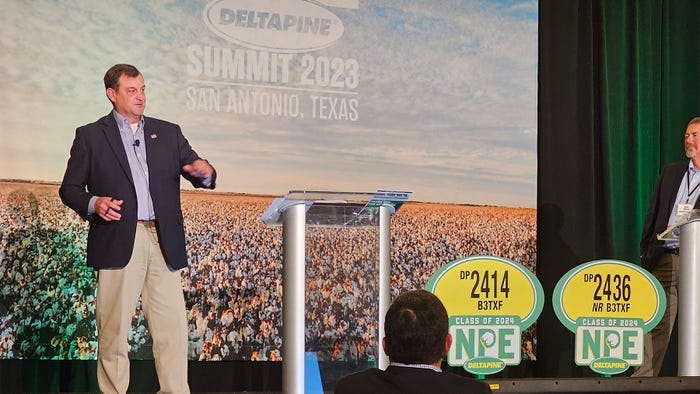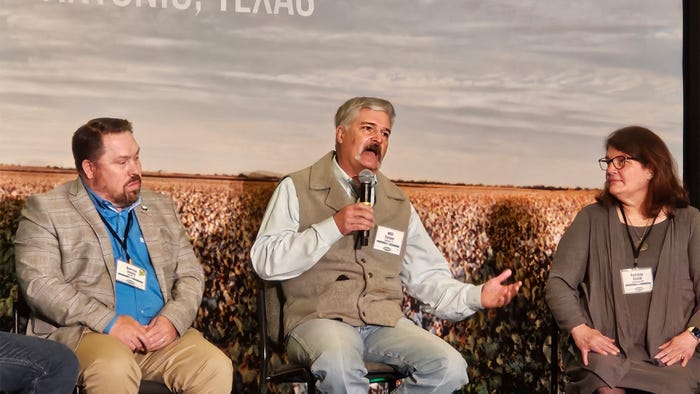
Eric Best, Deltapine cotton product manager Shelley E. Huguley
Producers from across the Cotton Belt gathered in San Antonio, Texas, Dec. 8 and 9, for Deltapine’s 2023 NPE Summit, where the 2024 Cotton Variety Class was unveiled.
“We looked at eight different candidates this year across the Belt,” said Deltapine Cotton Product Manager Eric Best in an interview with Farm Press. “Some of those were B3TXF, some were nematode with ThryvOn and some were ThryvOns.” (ThryvOn technology is a cotton biotechnology trait that provides protection against key tarnished plant bug and thrips.)
Varieties up for consideration were evaluated in field plots grown by Deltapine’s New Product Evaluators (producers) and then voted on through the program. Two varieties made the cut: Deltapine 2414 B3TXF and DP 2436NR B3TXF.

Class of 24: Eric Best, cotton product manager, left, Dave Albers, product development manager, both of Deltapine, announce the new varieites. (Photo by Shelley E. Huguley)
Early season variety
Deltapine 2414 B3TXF is a good fit in earlier season-type markets where producers are looking for a ThryvOn, Best said.
“It’s a good companion to something like Deltapine 2115 or 2211. So, the northern tier, maybe the northern upper Mid-South, upper Southeast, Carolinas, possibly some fit in the Texas areas. We tested that one as 2112.”
This variety, which also includes improved storm tolerance compared to DP 2211 B3TXF, had a 75% performance approval rating from NPE growers.
A West Texas variety
Deltapine 2436NR B3TXF was primarily tested in West Texas. “This is a new nematode-resistant product and ThryvOn. So, it brings root-knot nematode resistance and a ThryvOn package to those growers in West Texas in that true mid environment with that new trait platform,” Best said.
This variety also includes a disease package with bacterial blight resistance and moderate verticillium wilt tolerance. It had an 89% performance approval rating from NPE growers, as likely to purchase and plant.
Cottonseed availability
Both varieties are available for purchase. “Now, as with any other new class, there are always introductory quantities. The broader the fit, typically the more we have to spread out,” Best said. “2414 will probably be spread out across the Belt and 2436 probably in West Texas, South Texas and Central Texas.
“A lot of times this stuff is still grown in this current year to seed production. So, we still have to work through some things as far as seed quantity and seed quality, get that stuff in, see what passes quality and see what ends up in the bag. But I’m very confident in the introductory quantities.”
Looking ahead
While introducing the 2024 Class, hints were dropped that 2025 might have a “robust” class. “It could be,” Best said. “I don’t like to speculate. I’m always one of those guys that [says]: prove it. We had a panel today with the breeders and production, all those folks who are critical to bringing these new things to market. And that’s part of the fun of the program. We have some years like this, that there are two, but they’re two good ones.

Deltapine panel discussion: from left, Darren Jones, cotton product development scientist; Will Turner, U.S. cotton field production lead; and Patricia Smith, row crop senior sales forecasting manager. (Photo by Shelley E. Huguley)
“We heard the breeders talk about the native traits. They talked about bacterial blight, verticillium, seed size, yield ultimately, quality, root-knot, the reniform piece of those native traits. That’s the type of stuff we’re seeing coming on the heels of some of this.”
Looking back
Deltapine also announced the retirement of the number 46. “Because of the NPE program and NPE growers, we had a successful variety out of the Class of 2016 called 1646. It’s still planted and grown today on a wide range of acres across the U.S. Cotton Belt. That variety has surpassed 2 million bags of sales, so pretty substantial for our product. It’s only been done or even approached one other time with 555, prior to the NPE program.
“So, based on the success of that product and the folks we had here in attendance that we were able to recognize and helped make 1646 commercial, and in front of the growers that said we needed that variety, we retired the number 46 and recognized the folks responsible for it.”
Best said the seed will remain available, but the number will not be used for future classes or advancements. “It’s been retired.”
Read more about:
SeedAbout the Author(s)
You May Also Like






